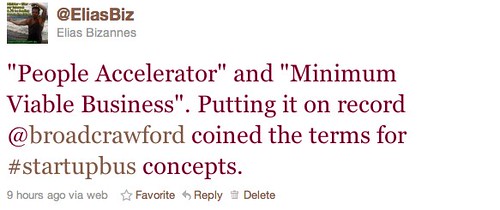One of the StartupBus teams this year was interviewed by Y-combinator. They were turned down. Why? According to the team, it was because they were not a billion dollar company. This is something I’ve warned StartupBus teams before when they pitch investors so it doesn’t surprise me. But there’s a lesson here that I hope all entrepreneurs understand.
Professional investors are in the game to make money. Their motivation is to generate a multiple on the fund they have raised.
Why is that a problem you may ask?
Well, who cares if a company makes a billion dollars? Apparently from sounding cool that you built something like that up, as a founder, you will be so diluted through multiple rounds of funding that you will probably have a 5- 30% equity stake in the business, depending on how capital intensive the business is and how many co-founders you have.
A VC however, not only makes money on a billion dollar exit, but they get to brag about it to limited partners and to attract new entrepreneurs, which helps them raise new funds and get new deals. The way it works in venture capital is that it is all about the brand and communicating your successes. Any investor that doesn’t admit to not knowing what they are doing are full of shit. Because billion dollar exits come in two forms: entrepreneurs who successfully played a game to take advantage of the current market (ie, an acquisition today that had it not happened may not have become a sustainable business) or fundamentally disruptive businesses that no one saw coming. I can think of many examples of the above, but I’ll hold back as my knowledge of various companies are not mean to be public — however, all that matters is the point that billion dollar exits are either due to a confluence of market factors or a fundamentally disruptive business model. You can’t predict for that. Which is why the safest strategy, as an investor, is to back a proven entrepreneur who knows how to make opportunities like that happen.
While investors look for the 15 deals that generates 96% of the returns in a year, let’s bring this back to the entrepreneur only making $300m. Put another way, a billion dollar business is more like a $300m business for you financially speaking (assuming you have 30% of the entity, a best case scenario). But if you are a $300m business pitching a VC, you probably won’t meet the investors cost of capital (ie, their fund is $300m+) and so therefore they don’t get the returns to justify their capital. Putting that into context, a billion dollar startup that a founder has a 30% equity stake in and a $333m startup that a founder has a 90% equity stake in — is, financially speaking, the same. And what I mean by that, is the people who will make that “billion” dollars (the founders) will need to work three times harder for the same return…meaning by raising financing, the market problem that needs to be serviced needs to be three timeS bigger so that people sitting in the backseat (the investors) make just as much money out of it.
Which means absolutely nothing about the problem you are solving in the world. The fact the entire silicon valley ecosystem is influenced by the investor industry, at a time when the costs of doing a startup have dropped dramatically — is a misalignment that will change one day.
If an investor says your business isn’t biggest enough, it means 20% of your hard work isn’t high enough to meet their capital hurdle of providing a certain return to their limited partners which will impact the investors future fundraising. And sadly, this fact is lost on a lot of entrepreneurs who feel they need a sense of validation despite having identified a real market problem. Which ironically, I think is what separates the true disruptive entrepreneurs from the rest. They are the ones that say “fuck you, I’m going to make this work”. And they end up disapproving the assumptions the investors falsely asserted when rejecting the teams’ vision because fundamentally disruptive businesses are never obvious from the outset.




